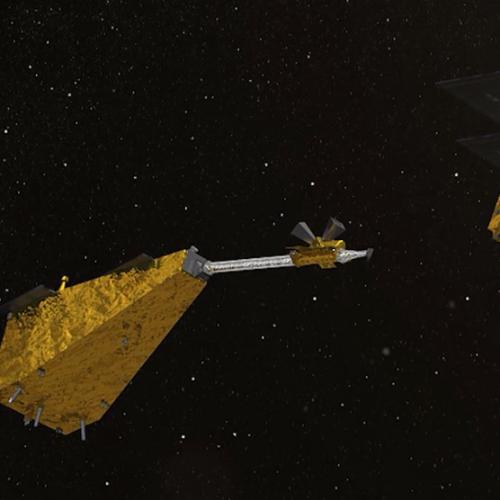



The Macao Science Satellite 1 network, China's leading space-based geomagnetic monitoring system, has achieved remarkable feats and attracted scientists from around the world, according to a top member of the program.
Zhang Keke, director of the Macao Institute of Space Technology and Application, said in an exclusive interview on Tuesday that research into geomagnetic fields is one of the frontier spheres in the international science community and the two-satellite network is able to accurately detect and measure the space-time variables of Earth's magnetic fields.
"Thanks to the data obtained by the satellites, we have been able to make breakthroughs in several fields. For instance, we have created the first version of a world magnetic model that has big potential in deep-space and deep-sea explorations, air and sea transport, as well as natural resource prospecting.
"We have also, for the first time in China, made a map of the global lithosphere's magnetic anomalies and revealed the magnetic structures of global tidal movements," said Zhang, who is also chief scientist of the Macao Science Satellite 1 project and chair professor at the Macau University of Science and Technology.
The scientist said the two-satellite network has world-class detection capability and accuracy. "It is extremely difficult to measure our planet's magnetic field vectors. It is highly likely that the magnetic field data obtained by our satellites is the most accurate in the world," he said.
After witnessing the success of the satellite system, the Royal Astronomical Society in London, the United Kingdom, has arranged workshops for scientists from 11 nations to discuss the scientific value of the data.
So far, a total of 18 foreign organizations have signed joint research agreements with Zhang's team, according to the professor.
On Tuesday it was announced that the Macao Science Satellite 1A and 1B had started formal operations after six months of in-orbit trials.
Jointly developed by scientists from the mainland and Zhang's team at the Macau University of Science and Technology, the satellites were launched into space on May 21.
Over the past six months, the two satellites have carried out a host of capability tests.
The satellite platforms were designed and built by the China Academy of Space Technology in Beijing and Northwestern Polytechnical University in Xi'an, Shaanxi province. The scientific equipment on the satellites, including a vector field magnetometer, an energetic electron spectrometer, a coupled dark state magnetometer and a solar X-ray detector, were provided by Zhang and his fellow scientists.
The two satellites are tasked with obtaining data on different layers of the Earth's system in the South Atlantic by detecting the geomagnetic anomaly area; studying the origin and evolution of the geomagnetic field and the geomagnetic inversion mechanism; and drawing a high-precision and high-resolution lithospheric geomagnetic map.
The satellites are the world's first scientific satellites to be put into a near-equatorial orbit to study the space environment and geomagnetic field, specifically the South Atlantic Anomaly, from outer space, the China National Space Administration said.
"The magnetic field over the South Atlantic Anomaly is the weakest on Earth, which means any man-made vehicles traveling in this region, ranging from jetliners to spaceships, are more susceptible to the impact of high-energy particles from our sun. Our research results will be used to improve the operations and safety of aircraft and spacecraft," Zhang said.
If you have any problems with this article, please contact us at app@chinadaily.com.cn and we'll immediately get back to you.